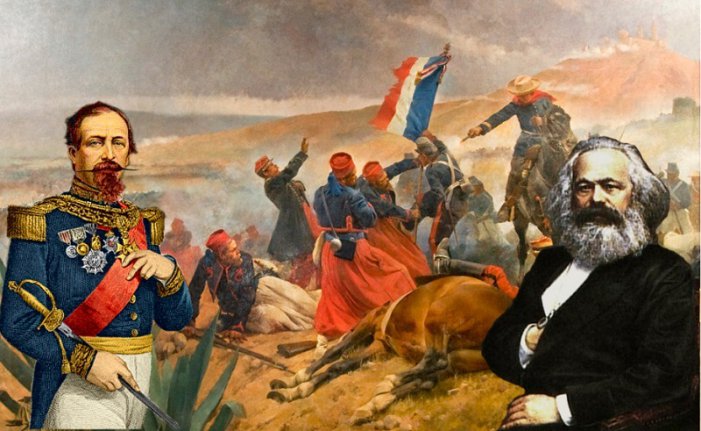|
Cinco de Mayo is commonly associated with drinking, sombreros and many other Mexican stereotypes. It is actually a holiday celebrating the defeat of a French army by the Mexicans. Karl Marx, who’s birthday is May 5th, denounced the French invasion and sided with the Mexican people. Mexico’s history during the 19th century was turbulent. A young country that had recently gained its independence, Mexico had to deal with both a vast territory and the unresolved question of which form of government to establish. After a brief period of monarchy, headed by Agustín de Iturbide, in the first half of the 19th century, Mexico had several coups d’etat and republican administrations that shifted between centralist (conservative) and federalist (liberal) forms of government. After the defeat of Antonio López de Santa Anna in the US-Mexico war, the so-called Ayutla Revolution put younger politicians in power with demands for liberal reforms, including the separation of church and state as well as land reform. The liberals’ victory in 1857 brought a new constitution that legalised the Reform laws. These laws represented first steps towards the establishment of capitalism in Mexico. However, the Conservative Party still had relatively wide support among the population. Tensions came to a breaking point as president Ignacio Comonfort carried out a self-coup and did not recognise the 1857 Constitution, reigniting the civil war. This marked the beginning of the Reform War (1858-1861) The liberal victory in this war forced the conservatives—including many staunch monarchists—to contact the European monarchs in search of political and material aid to restore their power. Meanwhile, Benito Juárez—who became president after Comonfort’s coup—was cornered in a tough financial situation and declared the suspension of payments of the foreign debt. Spain, Britain and France sent troops to demand that the Mexican government immediately resume repayment of the debt. Negotiations ensued and British and Spanish troops eventually withdrew. France, however, kept its soldiers in Mexican territory. France’s second intervention in Mexico had begun. Napoleon III: from Tragedy to FarceHegel remarks somewhere that all great world-historic facts and personages appear, so to speak, twice. He forgot to add: the first time as tragedy, the second time as farce. This is how Marx described the coup d’etat of Louis Bonaparte in France in 1852. In his famous work The 18th Brumaire of Louis Bonaparte, Marx drew numerous parallels between Napoleon’s original coup and the “farce” carried out by his nephew five decades later, attempting to rebuild the old French Empire that the Congress of Vienna had dismantled. Louis Bonaparte, renamed Napoleon III, entered into discussions with the Mexican conservatives and saw an opportunity to win an ally against the growing hegemony of the United States on the American double continent. Thus, he sent Maximilian von Hapsburg to establish a puppet government for Mexico. At the time Marx was working as a journalist and correspondent of the New York Tribune. In its pages he denounced the intervention: The contemplated intervention in Mexico by England, France, and Spain, is, in my opinion, one of the most monstrous enterprises ever chronicled in the annals of international history. […] But, nevertheless, it is certain that the French plan was far from being matured, and that both France and Spain strove hard against a joint expedition to Mexico under English leadership. Marx condemned the joint intervention, while at the same time apparently distancing himself from his early stance in 1848 (when he favoured the U.S. invasion of Mexico) since he now criticized how the independence of Texas was used to expand slavery. The Battle of Puebla and the French Retreat On May 5, 1862, Mexican troops under General Ignacio Zaragoza defended the city of Puebla from the French. Fighting alongside indigenous people from the Pueblan sierra and the villages of Xochiapulco, Tetela and Zacapoaxtla, armed with machetes, they managed to defeat the French zouaves of General Latrille de Lorencez. Marx’s last article in the New York Tribune, coincidentally enough, refers to Mexico. Published in 1862, Marx once again denounced the joint intervention and accused the British government of taking advantage of weaker nations. Although the war between France and Mexico—known in Mexico as “the Second French Intervention” (the first being the so-called “Pastry War” of 1838)—did not end until 1867, the heroism of the Mexicans, who resorted to guerrilla warfare, was able to defeat Maximilian’s puppet empire. Simultaneously, the growing presence of Prussia on the European and international stage pressured Napoleon III to withdraw his armies and in preparation for war against the Germans. The end result of that war, the Franco-Prussian War of 1870-71, was the first working-class government of history: the Paris Commune. The preface for this was Napoleon III’s failed adventure in America, defeated by the heroism of the Mexican people. This did not escape the keen eye of Karl Marx. AuthorÓscar Ferńandez is a member of the Socialist Workers' Movement (MTS) in Mexico and a graduate of political science at the Universidad Iberoamericana. He is a Left Voice correspondant in Mexico City and a member of the editorial staff of our sister site La Izquierda Diario México as well as the magazine Ideas de Izquierda México. This article was republished from Leftvoice. Archives May 2022
0 Comments
Leave a Reply. |
Details
Archives
July 2024
Categories
All
|

 RSS Feed
RSS Feed